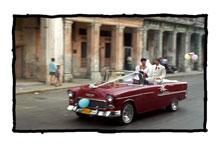Missouri Southern alumni, friends, students, professors experience Cuba

Although most Cubans are relatively poor, they still manage to have a good time. Salsa music, fiestas, laughter and dancing are common sights and sounds in the city.
A group of 25 Missouri Southern alumni, students and friends spent their New Year’s Eve in a country that has been closed to Americans for more than 40 years.
The trip to Cuba was created for Southern alumni, many of whom attended the College before 1996 when the international mission was established. The eight-day trip, from Dec. 28 to Jan. 4, was the first international adventure organized by the Alumni Association.
Southern obtained a travel license from the State Department allowing the College to run educational visits to Cuba. After a successful trip to the country in March 2002 with a group of students, Dr. David Locher, associate professor of sociology, and Dr. Larry Cebula, associate professor of history, returned to help guide the alumni trip.
For most of the trip, the group stayed in Cuba’s capital city, Havana. During their stay, members explored the city, visited museums, monuments, the beach and spent New Year’s Eve at the Tropicana nightclub. The group ventured out of the city for a few days to Viñales, a small town in the eastern province of Pinar del RÃo.
Many of the travelers had unique experiences in Cuba.
“I looked forward to spending New Year’s Eve in the Tropicana, which was great,” said Michelle Yipe, senior history major. “How many people have spent New Year’s Eve at the Tropicana and seen a show like that?”
Cebula said the night at the Tropicana was a highlight of the trip. Another memorable experience for Cebula was visiting the home of a Cuban he and Locher met.
“The conditions these people lived in were so shocking,” Cebula said. “There were at least six people living in this horrible little room; the boy was rail thin. That sight sort of stuck with me the rest of the trip.”
Johanna Page of Sagamore Hills, Ohio, said she enjoyed spending a day driving around the city with a taxi driver and getting to understand his situation.
“He could get a job as a pharmacist, but he chose to be a taxi driver,” Page said.
In Cuba, a doctor typically makes $25 a month, while someone working in the tourism industry can make that in a day.
Jack Brannan, a 1954 graduate of Joplin Junior College and former sports editor of The Chart, said he enjoyed getting acquainted with Cubans and their way of life.
“Seeing la lucha (the struggle) and the revolution as the dominant way of life,” Brannan said.
“I have a much greater appreciation for the people of Cuba, their culture and their city, Havana, than I ever had before.
“I have a greater understanding of what brought about the situation (in Cuba). Havana is a great proof of the failure of socialism and its practice.”
Brannan was in Washington, D.C., working for United Press International after the revolution began to take place in Cuba. He interviewed Castro’s sister, Juana Castro, in 1964.
Albert Grabow, traveling with his wife Mary, who is a Missouri Southern alumna, had a different perspective of Cuba. He was there during the revolution in 1958 and 1959.
Grabow said the highlight of his trip was to see Havana and how it’s changed in 44 years.
During New Year’s Day 1959, the anniversary of the revolution, Grabow was a college freshman visiting Cuba. He was scheduled to leave the country Jan. 3, 1959, but his return flight home was delayed a week because of the revolution.
“They shut the airport down because they were trying to arrest the Batista supporters, so no one got in or out,” Grabow said.
Grabow can remember when he saw some of the revolutionaries first coming into town.
“There were six young guys with long scraggly beards driving in an old Chevy, looking up at the big buildings with a machine gun pointing out the back window [of their car],” he said.
“Everything is almost the same except 44 years of decay. The countryside is the same, but Havana is worse. It’s surprising how little the economic revolution has accomplished.”
“I enjoyed myself immensely,” Yipe said in the airport while awaiting for the plane to depart to Miami. “If I ever have another chance to go abroad, I’d go to Cuba.
“Just seeing the whole culture mix, it was so neat. I just loved it. I want to come back and see all the places I missed.
“I’ve always wanted to travel. I was thinking they were a little more backward than they are; they’re catching up fast. The only thing I will not miss about Cuba are the toilets without seats.”
The trip was organized by Lee Pound, alumni director, with help from Cebula and Locher. The alumni office sent out surveys to the Cuba travelers in an effort to collect feedback that will help when organizing future trips. During the February Alumni Board meeting, members will go over the survey responses and begin planning the next alumni trip. The destination and date have not been decided for any future trips.
Your donation will support the student journalists of Missouri Southern State University. Your contribution will allow us to purchase equipment and cover our annual website hosting costs.



























